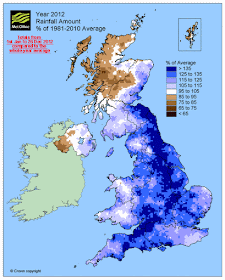2012 saw Britain come out of one of the severest droughts on record in 2011. March was the driest for more than half a century leading to activation of hosepipe bans across much of England. While the year started dry it then set new rainfall records for the wettest April, and the wettest June for the UK causing widespread flooding.
The persistent wet weather resulted in total 2012 rainfall for the UK of 1330.7 mm, which is just 6.6 mm short of the record set in 2000.
Top five wettest years in the UK:
1 2000 1337.3 mm
2 2012 1330.7 mm
3 1954 1309.1 mm
4 2008 1295.0 mm
5 2002 1283.7 mm
Although there is a great deal of variability in UK rainfall because of constantly changing weather patterns, the Met office says that there is now preliminary evidence suggesting a trend for slightly more rain in total, with it falling in more intense bursts.
Extreme rainfall events are also becoming more frequent. Professor Julia Slingo, Chief Scientist at the Met Office, said:
"The trend towards more extreme rainfall events is one we are seeing around the world, in countries such as India and China, and now potentially here in the UK. Much more research is needed to understand more about the causes and potential implications.
"It's essential we look at how this may impact our rainfall patterns going forward over the next decade and beyond, so we can advise on the frequency of extreme weather in the future and the potential for more surface and river flooding. This will help inform decision-making about the need for future resilience both here in the UK and globally."
The Met Office statement says that changes in sea surface temperatures and reducing amount of Arctic sea ice could be influencing the increase in rainfall, but that more research was required to establish how big a role they play. The increase in global temperatures is another factor with a warmer atmosphere able to hold more moisture. "From basic physics, this would equate to about a 4% increase in moisture in the atmosphere which means there is a greater potential for heavy rain." said the Met Office Statement.
Helen Roberts, a forecaster at the Met Office told the Guardian that changes to the jetstream were to blame for the increased rain during summer months:
"As to the cause, the jetstreams that sweep high over the country were largely to blame. Jetstreams carry ribbons of air at high speeds and altitudes and normally trap regions of high pressure over Britain in summer," she said. "But this year the jetstreams trapped a region of low pressure over the country for several months in summer and that, in turn, brought all that rain to the country."
Scientists believe this change in the jetstream may be one of the impacts of record global warming in the Arctic and the record melt of summer sea ice which is causing the Jetstream to slow down and produce a more sinuos path. A kink in the jetstream with a blocking high pressure system was also the likely cause for Hurricane Sandy to veer north west into New Jersey and New York instead of out to sea.
In mid December torrential rain caused major flooding around Britain, particularly in the southwest. Over 200 flood alerts and 40 flood warnings were issued, with landslips reported, and major disruptions to public transport and flooding of roads causing havoc to holiday shopping and holiday travel plans.
A report released in January 2012 on UK Climate Change Risk Assessment (CCRA) by the Department for Environment, Food and Rural Affairs (DEFRA) rated flooding risk as the worst climate change threat facing the UK. The Guardian reported that:
"The four most immediate "high consequence" risks all concerned flooding, with the expectation that in 10 years or so there will be increased flood damage to homes, with knock-on effects on insurance premiums and mental health. Between 1.7 million and 3.6 million people are expected to be at risk of flooding by 2050, without investment to lessen the threat. Surface water flooding would be likely to get worse, Watson added."
Amazingly, the UK Government made substantial cuts to the UK flood defence budget in 2011.
The Met Office has also forecast that it is "very likely that 2013 will be one of the warmest ten years in the record which goes back to 1850, and it is likely to be warmer than 2012....Global average temperatures in 2012 were 0.45 °C above the long term average based on data from the three international global temperature datasets used by the World Meteorological Organization. 2012 is currently ranked the 9th warmest year on record."
Sources:
- UK Met Office media release - Statistics for December and 2012 - is the UK getting wetter?
- UK Met Office media release - Met Office 2013 annual global temperature forecast
- Image - 2012 rainfall anomaly 1 Jan to 26 Dec - from Met Office News Blog, 27 December 2012 - How wet has 2012 been? Is it a record breaker?


No comments:
Post a Comment